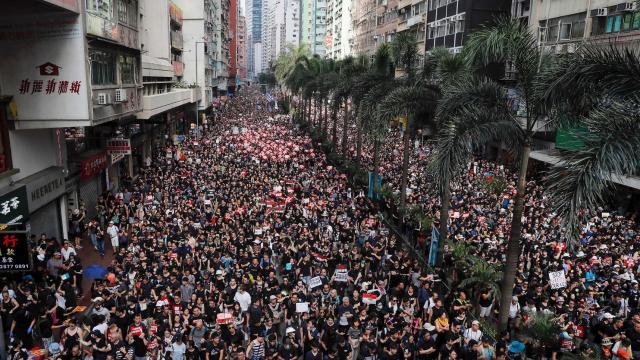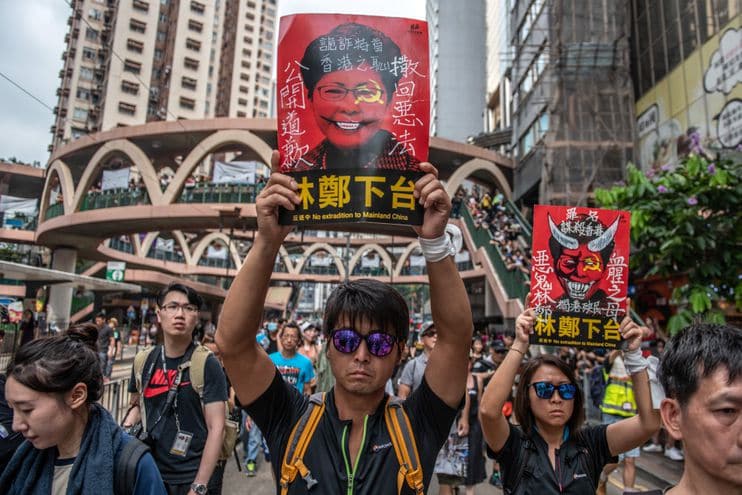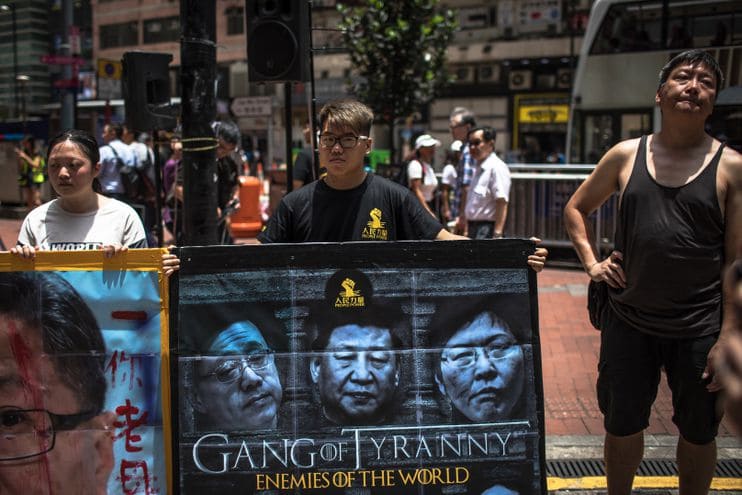
Protesters filled Hong Kong’s streets again on Sunday, cramming subway stations and turning roads into a sea of black, in another massive hours-long demonstration against their government’s handling of a proposal to allow extraditions to China — even after the city’s leader said she would suspend the bill.
Organizers estimated the turnout Sunday at nearly 2 million participants, in a territory of some 7.4 million — making plain the growing rupture between Hong Kong’s government, heavily influenced by Beijing authorities, and its people.
The march capped a dramatic week of protests in varying numbers across the global financial hub. Demonstrators forced police to open six-lane roads and took over streets that were not authorized for their rally.
The huge outpouring delivered yet more embarrassment for Hong Kong’s leader, who finds herself increasingly isolated in the city despite her efforts to contain the growing anger.
Hong Kong’s chief executive, Carrie Lam, said Saturday she would suspend debate on the bill in an effort to “restore calm and peace” to Hong Kong. After protests swelled on Sunday, she apologized to the people of Hong Kong for “deficiencies in the government’s work” and promised to “adopt a most sincere and humble attitude to accept criticisms and make improvements.”
But she has stopped short of withdrawing the bill altogether. She has insisted the proposal — which would allow fugitives to be extradited to countries without a formal treaty with Hong Kong, including China — is “laudable.”
Lam’s decision to back off the measure for now did not placate the crowds who showed up in a march that stretched more than three miles in either direction from its planned starting point. Police estimated turnout at 338,000, but they counted only the participants along the official march route.
Many expressed deep dissatisfaction with the way Lam has handled the bill and responded to the opposition. A 27-year-old woman in the crowd said the suspension of the bill has “changed nothing.”
“She is so evil,” said Sabrina, who gave only her first name out of fear of retaliation. She teared up as she spoke about Lam. “She hasn’t heard anything from us.”
Sunday’s crowd, no less energized than in previous demonstrations, included the elderly, people with disabilities, children with their families, business executives, social workers and students, all demanding the permanent withdrawal of the extradition bill. The protesters, who waited for hours under a blazing sun to begin their march, chanted for Lam to step down and for Hong Kong to “add oil” — a Cantonese cheer that means “keep going.” Banners called for Hong Kong’s independence.
At one point, members of the crowd started singing “Do You Hear the People Sing?” — the call to action from the musical “Les Misérables.”
Major roads across the city were packed with protesters — a thronging mass shuffling slowly toward government buildings that protesters had occupied on Wednesday that prompted violent clashes with police.
Police presence around these roads and buildings Sunday was light compared with previous days, but the chief executive’s residence was heavily guarded.
By evening, protesters had taken over Harcourt Road, the main street around the complex that houses Hong Kong’s legislature. The road had been left open by authorities but was later closed to traffic.
Demonstrators held up signs calling for the government to withdraw charges against protesters arrested in Wednesday’s clashes and for “those who open fire to be held accountable” — a reference to what many perceived as police brutality in response to those demonstrations. Police fired 150 canisters of tear gas within a short period that afternoon, along with rubber bullets, beanbag rounds and other projectiles to clear protesters.
“People are really angry about the police brutality and the response of the government,” said Nathan Law, founder of the pro-democracy party Demosisto.
As the demonstrations continued late into the night — with thousands of young people sitting down on roads that would ordinarily be busy with traffic — the Civil Human Rights Front, which helped coordinate the event, declared a historic victory for its movement.
Protesters rejected Lam’s apology and reiterated their demands. They want her to withdraw the bill and to step down, and for police to be held accountable for the clashes on Wednesday. Until then, they said, they will continue to plan more mass action in their city.
One protester died Saturday after falling from a building on which he had draped a long banner that read “No extradition to China” and “Total withdrawal of the extradition bill,” among other demands.
It is unclear how exactly he fell. But his death further galvanized demonstrators. Some waited hours to leave flowers at the site of his death, where the smell of incense wafted. An artist in the crowd painted a portrait of the man, who was dressed in a yellow raincoat when he fell. One sign read: “You will be the last. No more.”
“It is important for us to remember how people have sacrificed themselves for this,” said Cindy, a 22-year-old protester who also wanted only her first name used, as she waited in a snaking line to place a single white carnation. “We are here because we love this place and want to do what we can.”
The extradition plans were first floated after a gruesome murder in Taiwan, where officials say a pregnant woman was brutally killed by a Hong Kong resident who later admitted to the crime. Without an extradition treaty, prosecutors could not send him to Taiwan for trial but also could not charge him with murder in Hong Kong. He is in jail on a lesser crime.
Yet, Taiwan’s President Tsai Ing-wen has not pushed for the man to be sent to Taiwan and instead has spoken against the extradition bill, saying Thursday she would not become a “culprit to an evil law.” Taiwan has also said it will not be involved in any extradition proposals that imply it is part of China.
The protesters on Sunday included Kai Chieh Hsu, a 29-year-old Taiwanese man who flew to Hong Kong to join the demonstrations. He said he was there in solidarity and did not want his own country cited as a reason for a new extradition law.
“Taiwan and Hong Kong, we are both bullied by” China, said Hsu. He said the murder case cited by Lam is a terrible justification for the bill.
“I’m really angry that Taiwan is being blamed for this.”
Many in Taiwan have supported Hong Kong residents and expressed admiration for their fight. On Sunday afternoon, a group of Hong Kong students in Taipei, the Taiwanese capital, organized a rally to support the protesters in their home city.
On Thursday, some of the Hong Kong students met with Tsai’s secretary general, Chen Chu. Among other things, they asked Taiwan to establish protections for political refugees from Hong Kong and Macau. In April, Hong Kong bookseller Lam Wing-kee fled to Taiwan, citing a fear of being extradited to China. Taiwan does not have a formal refugee law and has maintained it will decide the status of dissidents on a case-by-case basis.
In Taipei, the Hong Kong protests are raising awareness of the potential effects of China’s influence. The extradition law has led people in Taiwan to “care more about the situation,” said Hong Kong student Katy Cheng, who has lived in Taiwan for three years. “They don’t want to be the next Hong Kong.”
Originally published on the Washington Post













